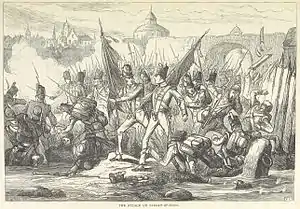| Siege of Bergen op Zoom (1814) | |||||||
|---|---|---|---|---|---|---|---|
| Part of the War of the Sixth Coalition | |||||||
 British illustration of the attack | |||||||
| |||||||
| Belligerents | |||||||
|
|
| ||||||
| Commanders and leaders | |||||||
|
|
| ||||||
| Strength | |||||||
| 2,700[1] | 4,000-9,000[1] | ||||||
| Casualties and losses | |||||||
| 500-600[1] killed, wounded, or captured |
920-1,900 killed and wounded[1] 2,263 captured[2] | ||||||
 Location within Europe | |||||||
Campaign Low Countries 1814
The siege of Bergen op Zoom (8 March 1814), took place during the War of the Sixth Coalition between a British force led by Thomas Graham, 1st Baron Lynedoch and a French garrison under Guilin Laurent Bizanet and Jean-Jacques Ambert. The initial British assault force seized part of the defences, but a well-managed French counterattack compelled much of the assault force to surrender. Bergen op Zoom is a port in the Netherlands about 70 kilometres (43 mi) south of Rotterdam and 40 kilometres (25 mi) north of Antwerp in Belgium.
Assault
French General Guilin Laurent Bizanet had 2,700 soldiers in the garrison when, under cover of night and using local intelligence, Graham attacked. The French, however, were positioned well, and the population allied with them as they fought in the streets. The attacking British troops took heavy casualties. General Bizanet remained in control of Bergen op Zoom until a peace accord was signed.
Forces and casualties
One source named Bizanet as the governor and Jean-Jacques Ambert as the French commander. The 2,700-man French garrison sustained 500 killed and wounded and 100 captured during the action. Depending on sources, the British assault force consisted of between 4,000 and 9,000 men. Of them, between 2,100 and 4,000 were killed, wounded or captured. In addition to the units listed below, the source counted the 2nd Battalion of the 35th Foot in the assault force. The Guards Brigade consisted of three companies of the 1st Foot Guards and four companies each of the 2nd Foot Guards and 3rd Foot Guards, all from the 2nd Battalions of the regiments.[3]
British Order of Battle
Graham formed his troops into four columns as follows:[4]
| Commander | Unit | Number of Men | |
|---|---|---|---|
| 1st Column | Colonel Lord Proby | Brigade of Guards | 1,000 |
| 2nd Column | Lieutenant-colonel Morrice, 69th Foot | 55th Foot | 250 |
| 69th Foot | 350 | ||
| 33rd Foot | 600 | ||
| 3rd Column | Lieutenant-colonel Henry, 21st Foot | 21st Foot | 400 |
| 91st Foot | 100 | ||
| 37th Foot | 150 | ||
| 4th Column | Brigadier-general Gore / Lieutenant-colonel Carleton | 44th Foot | 300 |
| Flank companies of the 21st and 37th Foot | 200 | ||
| 1st Foot | 600 | ||
| Total | 3,950 | ||
Notes
- 1 2 3 4 5 6 Bodart 1908, p. 477.
- ↑ Burnham & McGuigan 2010, p. 216.
- ↑ Smith 1998, pp. 508–509.
- ↑ Barrington 1814, pp. 377–378.
References
- Bodart, Gaston (1908). Militär-historisches Kriegs-Lexikon (1618-1905). Retrieved 6 June 2021.
- Barrington, C. J. (1814). The Military Panorama, Or, Officer's Companion.
- Burnham, Robert; McGuigan, Ron (2010). The British Army against Napoleon. Barnsley, South Yorkshire: Frontline Books. ISBN 978-1-84832-562-3.
- Smith, Digby (1998). The Greenhill Napoleonic Wars Data Book. London, UK ; Mechanicsburg, PA, USA: Greenhill Books ; Stackpole Books. ISBN 9781853672767. OCLC 37616149.
Further reading
- Grant, Philip (2019). A Peer Among Princes - the Life of Thomas Graham, Victor at Barrosa, Hero of the Peninsular War. ISBN 9781526745415.
- Alison, Archibald (1842). History of Europe from the Commencement of the French Revolution to the Restoration of the Bourbons. Vol. 10. Paris: Baudry's European Library. Retrieved 13 February 2016.
- Nafziger, George (1994). "French Garrisons in the Lowlands, 1 January 1814" (PDF). United States Army Combined Arms Center. Retrieved 21 February 2016.
External links
 Media related to Siege of Bergen op Zoom (1814) at Wikimedia Commons
Media related to Siege of Bergen op Zoom (1814) at Wikimedia Commons